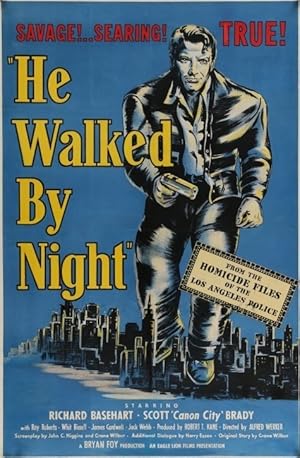
He Walked by Night Page #6
Synopsis: In the Post-World War II, in Los Angeles, a criminal shots and kills a police officer in the middle of the night. Without any leads, the chief of the LAPD assigns Sgt. Chuck Jones and Sgt. Marty Brennan to investigate the murder and apprehend the culprits. When the dealer of electronics devices, Paul Reeves, is caught selling a stolen projector, the police identifies the criminal, and connects him to other unsolved robberies. Using the witnesses of his heists, they draw their face, but the true identity of the smart and intelligent criminal is not disclosed. The perseverance of Sgt. Marty Brennan in his investigation gives a clue where he might live.
- APPROVED
- Year:
- 1948
- 79 min
- 288 Views
Watch the curbs. We'll go in here.
- Any sign of him?
- No.
We've searched every foot
between here and the Rio Hondo outlet.
Then he must be up ahead. Let's go.
The gas gun.
Translation
Translate and read this script in other languages:
Select another language:
- - Select -
- 简体中文 (Chinese - Simplified)
- 繁體中文 (Chinese - Traditional)
- Español (Spanish)
- Esperanto (Esperanto)
- 日本語 (Japanese)
- Português (Portuguese)
- Deutsch (German)
- العربية (Arabic)
- Français (French)
- Русский (Russian)
- ಕನ್ನಡ (Kannada)
- 한국어 (Korean)
- עברית (Hebrew)
- Gaeilge (Irish)
- Українська (Ukrainian)
- اردو (Urdu)
- Magyar (Hungarian)
- मानक हिन्दी (Hindi)
- Indonesia (Indonesian)
- Italiano (Italian)
- தமிழ் (Tamil)
- Türkçe (Turkish)
- తెలుగు (Telugu)
- ภาษาไทย (Thai)
- Tiếng Việt (Vietnamese)
- Čeština (Czech)
- Polski (Polish)
- Bahasa Indonesia (Indonesian)
- Românește (Romanian)
- Nederlands (Dutch)
- Ελληνικά (Greek)
- Latinum (Latin)
- Svenska (Swedish)
- Dansk (Danish)
- Suomi (Finnish)
- فارسی (Persian)
- ייִדיש (Yiddish)
- հայերեն (Armenian)
- Norsk (Norwegian)
- English (English)
Citation
Use the citation below to add this screenplay to your bibliography:
Style:MLAChicagoAPA
"He Walked by Night" Scripts.com. STANDS4 LLC, 2025. Web. 23 Feb. 2025. <https://www.scripts.com/script/he_walked_by_night_9730>.






Discuss this script with the community:
Report Comment
We're doing our best to make sure our content is useful, accurate and safe.
If by any chance you spot an inappropriate comment while navigating through our website please use this form to let us know, and we'll take care of it shortly.
Attachment
You need to be logged in to favorite.
Log In